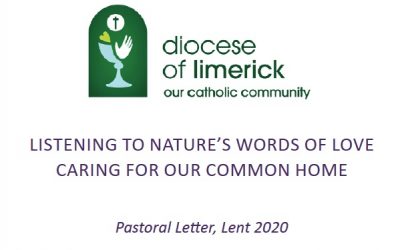
By Sarah Mac Donald - 03 March, 2020
 Lent is a good time to focus on ecological conversion, Bishop Brendan Leahy of Limerick has said in his new Pastoral Letter ‘Listening to Nature’s Words of Love’.
Lent is a good time to focus on ecological conversion, Bishop Brendan Leahy of Limerick has said in his new Pastoral Letter ‘Listening to Nature’s Words of Love’.
Quoting Pope Francis on the fifth anniversary of his encyclical ‘Laudato Si’ on the care of our planet, Bishop Leahy has urged people to “live Lent” this year with “our common home” as their motivation.
Lent, he said, is never meant to be simply an individual penitential exercise.
“Rather it is the season where together as a community we seek to let the Lord be more present within us and among us. In focusing on Lent in terms of an ecological conversion, we are taking steps that benefit not just us personally or our society today but we are also building up our community for the future.”
Citing the three traditional ways of “living Lent” through Prayer, Fasting and Almsgiving, Bishop Leahy said there are numerous options as to how we can live that through the lens of care for our common home.
“In the past year, Greta Thunberg has captured imaginations and minds. Not just her. Many young people, including across our diocese, have expressed their concern over what is happening our planet. They are really concerned about the world they are inheriting from previous generations,” the Bishop said.
Dr Leahy paid tribute to the schools across Limerick Diocese where children work towards the Green Flag awards.
“Young adults are searching for new ways to save our planet. There are young leaders on the environment emerging, brave and outspoken. It is important for those of us who are a little order to recognise that young people have the antennae of the future.”
In his pastoral letter, Bishop Leahy reminds the faithful that conversion is needed because environmental issues involve sin.
“Yes, we can name many scientific facts to do with the serious environmental crisis but we need also to acknowledge the place sin plays in bringing us to this point. What we learn from the creation accounts in the first pages of the Book of Genesis containing the stories of Adam and Eve and the original Fall, is that through sin our relationships with God, with our neighbours and with creation were broken.”
“And so the harmony that existed between God the Creator, humanity and creation as a whole was disrupted. Humanity (represented in Adam and Eve) tried to take the place of God without acknowledging that we are limited in our humanity needing to depend on and work with God. As a result, creation itself got abused.”
Greed took over and it still takes hold of us, Bishop Leahy warned.
“And greed can bring us to the point where, as Pope Francis puts it, we see every desire we feel as a right and gradually that destroys us: the mentality expressed in the slogans ‘I want it all and I want it now!’ and ‘Too much is never enough’, gains the upper hand.”
He underlined that during Lent, people get a chance, through fasting, prayer and almsgiving, to look more closely at their relationships with God, with others and with creation.
He noted that when it comes to care of the planet, Pope Francis often points to St Francis of Assisi as a great model and Bishop Leahy suggested that this Lent people might read something about the Saint.
St Francis, he said, is well known for his care of the poor and vulnerable.
“But he lived joyfully what Pope Francis calls ‘integral ecology’, that is, an ecology that takes into account the many inter-related dimensions of care of our planet – from respect for all human life to care of the poor, from contemplation of the beauty of creation to working for justice.”
Elsewhere in his 16 page pastoral letter, Bishop Leahy highlights a notion that Pope Francis repeats in his encyclical on the environment which is that everything is interconnected.
For him, the ecological question is linked to economics, justice, and respect for our human life and dignity.
“Our small everyday decisions and the big policy decisions as well as our economic and justice systems are all linked with our care for the planet, our common home, and care for human life at all stages.”
It’s not enough to know information about the environment or make laws about it, Dr Leahy stresses, we need to create what Pope Francis calls an “ecological citizenship” by cultivating good habits.
While it is important to acknowledge with gratitude the very important role schools and colleges play in promoting care for our common home, Pope Francis also stresses the importance of the family in forming people in the right attitudes to protect creation.
“The family is the place where, in a world often characterised by a culture of death, we learn the culture of life,” Bishop Leahy said.
‘Listening to Nature’s Words of Love’ can be read here: https://www.limerickdiocese.org/sites/ld/assets/File/2020/Limerick_Diocesan_Feb_2020_Bishops_Letter.pdf